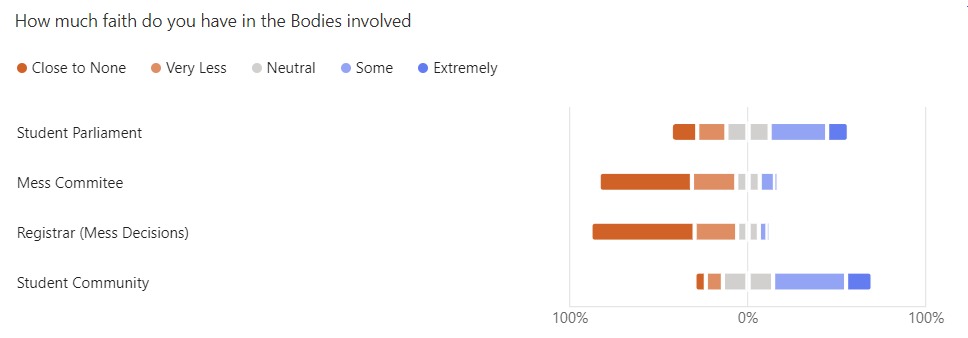We Are So Cooked

What does the new policy entail? We, at, Ping!, bring you all facts about the new policy, including details from the closed door meetings with the members of the Parliament. Credit: Aadi Prasad
(Note: This article, does not represent the views of Ping! or any of its members, in their capacities. It does, however, reflect most people’s personal views, including that of the editors.)
We are nearing the finish line of 2024. Some of us just completed our first semester while others are occupied with their thesis, research and placements. While we are in the process of wrapping up the year and thinking fondly of the semester, some college experiences haunt our memories and make us fear what we might have to face upon return.
Imagine unwinding on a Sunday and hoping to enjoy the chicken biryani served at Kadamba but instead of a piece of chicken, you find a cooked frog! And if that’s not enough, its hand gestures a mocking 👌 to attest to the quality of the food.
As expected, it triggered an uproar in the student community which insisted on better food quality.
As expected, the administration made many promises of improving the mess system.
As expected, the promises fell through …
Within a week, a rusted stapler pin was discovered on the plate of an unassuming student. Enough cannot be said about the risk it would have posed if actually consumed. This was yet another addition to a string of unfortunate events marking the downfall of our mess infrastructure. Although there were several incidents of unhygienic standards in the past, people learnt to overlook the occasional insect or stray hair in their food. Students would frequently get sick after eating in the mess, but their problems were blamed on ordering food from outside.
At the time of writing this article, the Kadamba mess is being renovated to increase the seating capacity, modernise its kitchen and address the hygiene issues. For the period of the renovation, the operations of this mess are being shifted to JC, and the existing infrastructure there is moving to BBC. “The food tastes better and I’ve seen plastic sheets over the cucumbers and they cover the food when not being served”, a student says providing evidence that baby steps are being taken in the positive direction.
However, a fresh uproar started with a new mess policy that many find absurd. The contents of the mail and the necessary background (including previous meetings of the faculty with the students and the MPs) are summarised in our previous article.
To reiterate the contentious policy, the changes are
- Migrating from a dedicated mess portal to IMS,
- Being restricted to one mess for all meals in a week
- Cancellations needing to be done four days in advance.
- Each mess has a fixed capacity and registrations need to be done in an FCFS manner.
- Unregistered students will not be able to avail the mess facilities and cannot pay to eat
In an effort to present both sides of this mess, we have reached out to the mess committee and the chair, Prof. Girish Varma on 29th December 2024. Ping! will share updates after our meeting with Prof. Girish.
To gauge the current pulse of the students, we sent out a form inviting opinions from the student community and we received detailed responses across batches. An outright majority of the respondents are very disappointed with the new scheme. It is important to note that whatever results we present do not guarantee the opinion of the whole student community, nor will they hold much statistical ground for a mess policy change, if any.
We wish to draw the reader’s attention to the fact that this is not just an issue about mess food, its quality and the registration policy. Rather, these incidents point to a systemic breakdown of trust and communication between the administration and student body. The students believe that their concerns and demands are being ignored, time and again. The administration believes that our demands are unrealistic and cannot be fulfilled (primarily, increasing the number of meal cancellations).
As members of the IIIT community, we are disappointed with the administration for hastily implementing new rules and regulations before the semester started instead of having some time for everyone to get used to, as decided earlier. It is unrealistic to assume that every decision should be taken based on the democratic opinion of the student body, but we expect some respect being paid to what we and our representatives say. Although the vote is split, students support their community and the parliament representatives a lot more than they trust the mess committee and the registrar. Our angst is thus exacerbated by the powerlessness of our voices.

An MP in the mess committee has informed us the following:
- The institute wishes for this weekly registration system to be permanent unless we can come up with a better one within the next two months.
- The mess portal is a black box where registrations are translated to the quantity of raw materials needed for the meals with the help of an intermediary mess office.
- Any new system proposed henceforth should be able to automate the work of the mess office to reduce the burden of the people involved.
The institute believes that the weekly registration system is easier from the administrative point of view as it does not require hiring more people for the mess office which is already running at a loss. Despite repeated questioning, it is presently not clear how the old system is not automated and what exactly will the new system provide.
There is little to no transparency in the operations of the mess. The kitchen design and new floor plans that are finalised have not been shared with the student body (we must note that floor plans for all buildings and messes are available on the Intranet). A private GitLab was created to share issues for resolution but it has not been updated. Although the current mess portal on IMS has a feedback section, there is little clarity on who will have access to them and how they will be resolved.
The root cause of dissatisfaction is the reduced flexibility. Most of us agree that the previous system of being able to choose the mess for our meals individually was far better. It seems that a smoothly operating system was changed out of the blue. In a prior meeting, the faculty informed us that the ingredients for the messes are ordered two days in advance. Is a four day window for cancellation really necessary or if it is merely an excuse to further curtail our flexibility? We cannot predict whether to cancel our meals half a week in advance in case we fall sick or find another frog. Effectively we will be forced to pay for the meals we do not end up eating.
Under the new scheme, unpaid or unregistered meals are no longer allowed. This raises an important question: will external visitors and interns still have access to dining in the messes? As of now, Ping! has not received any clarification on this matter.
It has come to our attention that the original mess portal’s backend was difficult to modify leading to the migration to IMS. Yet, this was executed hastily and is buggy. At least 2 people reported to have been able to register for the same meal multiple times. While a source shared that it was technical limitations that forced registering for every week, that does not seem to be the case on some investigation. The clumsy, mismanaged implementation seems highly ironic for a technology institute. All in all, it appears that this new plan was not well thought through.
If someone from the administration happens to be reading this, please note that it is our means of communicating our expectations from the system. We wish to work with you and we realize that you have our best interests in mind. Perhaps a dedicated management system would help? Maybe having an FSIS to hear our voices would provide a fresh perspective? Given that this is an engineering college, the student community and the sysadmins would be more than happy to help with the automation process.
There are many problems and few solutions, but if the students, administration and faculty coordinate, it is possible to come up with something that is not too heavy on the pockets while guaranteeing flexibility.
Thanks to Vaishnavi, Monish, Chinmay, Ihsan and the other anonymous sources for helping us cover the article.
Thanks to Aditya Shankar for the title “We are Cooked”
Our previous coverage on this issue can be found here.

 Felicity: The Price of the Party
Felicity: The Price of the Party  Log Kya Kahenge?
Log Kya Kahenge?  The river of time
The river of time  A CCC Response to ‘Campus Canine Affairs’
A CCC Response to ‘Campus Canine Affairs’  Campus Canine Affairs
Campus Canine Affairs  So Said UG1-F
So Said UG1-F  What does ‘Ee Sala Cup Namdu’ mean for RCB fans?
What does ‘Ee Sala Cup Namdu’ mean for RCB fans?  Mama, Put My GPTs in the Ground
Mama, Put My GPTs in the Ground  Have you tried turning the mess off and on again?
Have you tried turning the mess off and on again?